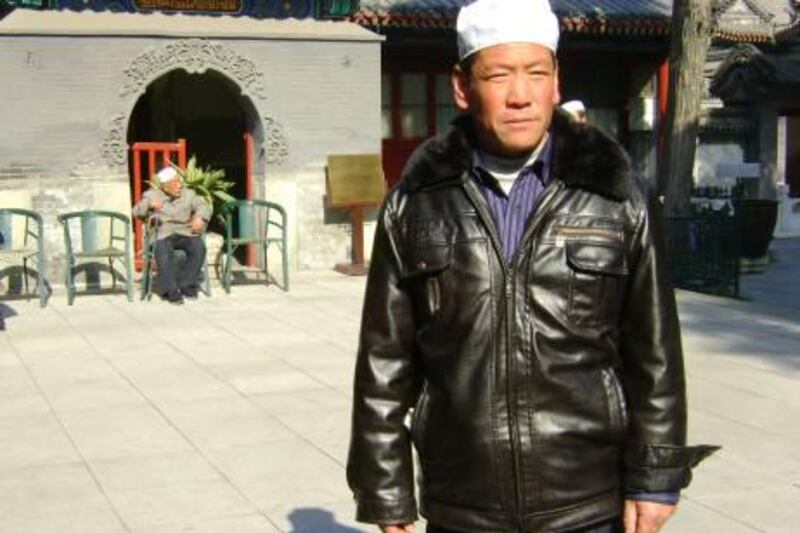BEIJING // When dozens of flights recently took off from China carrying Muslims on the Haj pilgrimage, Zhang Kebao remained at home in Ningxia province, reflecting on the financial impossibility of travelling himself.
Mr Zhang, 42, a member of the Hui Muslim ethnic minority earns about 10,000 yuan (Dh5,513) a year, at best a third of the price of a visit.
"The big problem for us is the expense," Mr Zhang said during a recent visit to a mosque in Beijing. Like many Muslims worldwide, the cost of going on Haj is prohibitive.
"We are peasants. We are farmers. We don't have enough money to go. It's a real pity."
While Mr Zhang is unable to travel, a growing number of his compatriots do make the trip, even if the numbers remain a tiny proportion of the more than two million visiting annually from around the globe, and an even smaller proportion of China's 23 million Muslims.
According to China's state administration of religious affairs, 11,200 Chinese Muslims have already left on chartered flights and, when the final figures are in, the total is expected to reach 13,000.
Four years ago, fewer than 10,000 travelled and, in 1985, when the authorities began allowing trips, little more than 10 went.
There are increasing numbers of flights to Saudi Arabia from provinces with large concentrations of Muslims. The country's largest airline, China Southern Airlines, recently began a Beijing-Dubai-Jeddah service, partly for pilgrims.
According to Xiaowei Zang, head of the school of East Asian studies at the University of Sheffied in England, the commercial success of many Hui people has enabled more to travel.
"They have got the money. They want to go not just for religious reasons, but for status," said Mr Zang, who has published extensively on China's Muslim minorities. "If they go and come back, they receive more respect and higher standing in their community."
The growth in the numbers going to Mecca tallies with a strengthening of Islamic identity among the Hui since the 1980s, when the authorities began to take a more relaxed approach to religion, he added.
China is happy for more travel to Mecca as they "very closely control" who takes part, said Dru Gladney, a professor of anthropology at Pomona College in California and the author of Muslim Chinese: Ethnic Nationalism in the People's Republic.
"They vet the pilgrims and many are government officials," he said, adding that some were not very pious and, before leaving, even had to take lessons in Muslim practices of worship.
The total number of Haj pilgrims is also limited by the Saudi authorities for practical reasons, as the vast numbers have led to accidents where pilgrims have been trampled to death.
China's relaxing of controls on the number of people allowed to go on the Haj reflects the authorities' desire to portray themselves as "very supportive" of Muslim minorities, Mr Gladney said.
"China very much wants to cultivate connections in the Middle East for trade and improving its image in the Middle East, by treating its Muslims well," he said.
Trade between China and Arab states last year was US$107.4 billion (Dh394.4bn). While looking to cement trade links with the Middle East, China is "very worried" about the rise of conservative Islam, Mr Gladney said.
"They want to keep a close eye on their Muslim population," he said.
In particular, greater scrutiny is paid to the Uighurs from western China's Xinjiang province, where nearly 200 people, mostly Han Chinese, died in ethnic riots in July last year. Xinjiang province this year sent more pilgrims than any other, with 3,200 Uighurs travelling from their home province.
But with 8.4 million of China's 23 million Muslims being Uighurs, proportionally their contribution to the Haj is below average. Greater controls over religion among Uighurs date back to the 1990s, when separatist movements in the province developed, Mr Zang said.
According to Abdurahman, a Beijing-based Uighur, it is "a little bit difficult" for Uighurs to get permission to obtain visas and travel in official groups. Restrictions have increased in the past five years, he said.
"There are lots of people from Xinjiang who want to go but they cannot," he said. "We are the main Muslims in China but, from them, only 3,000 were allowed to get a visa."
Abudumijiti, a Uighur visiting Beijing from Xinjiang, said he had been unsuccessful. "I came to Beijing to buy the visa in the embassy, but I didn't get the visa. I have enough money to afford the trip, but it's hard to get the visa because we are Uighur," he said.






